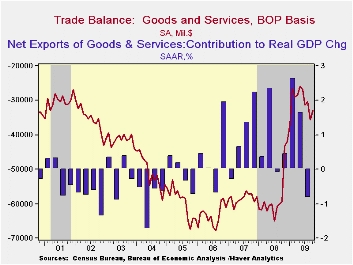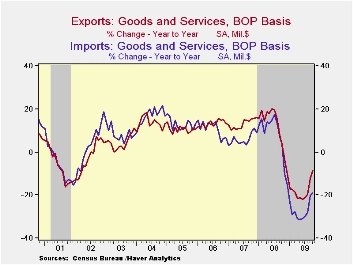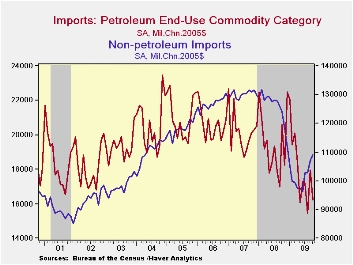 Global| Dec 10 2009
Global| Dec 10 2009U.S. Trade Deficit Falls As Exports Jump
by:Tom Moeller
|in:Economy in Brief
Summary
A lower value of the dollar improves the competiveness of U.S. exports. That undoubtedly was behind at least some of the decline in October's trade deficit to $32.9B following a September deficit of $35.7, which was revised lower from [...]
 A
lower value of the dollar improves the competiveness of U.S. exports.
That undoubtedly was behind at least some of the decline in October's
trade deficit to $32.9B following a September deficit of $35.7, which
was revised lower from the initial estimate. Exports rose sharply,
their sixth month of increase despite economic weakness abroad, while
imports fell with a modest decline in oil prices. The latest figure was
quite a bit lower than Consensus expectations for a deficit of $37.0B.
A
lower value of the dollar improves the competiveness of U.S. exports.
That undoubtedly was behind at least some of the decline in October's
trade deficit to $32.9B following a September deficit of $35.7, which
was revised lower from the initial estimate. Exports rose sharply,
their sixth month of increase despite economic weakness abroad, while
imports fell with a modest decline in oil prices. The latest figure was
quite a bit lower than Consensus expectations for a deficit of $37.0B.
Reflecting the competitive value of the dollar, nominal exports rose 2.6% m/m and by 12.4% from the April low. Adjusted for price inflation, however, the gain is more impressive. Real merchandise exports during October rose 4.1% (-6.0% y/y), the third such increase in four months. A higher chained-dollar value of non-auto consumer goods exports led the increase with a 7.9% (3.5% y/y) surge after the 3.7% September jump. Real capital goods exports were not far behind and posted a 3.6% gain (-10.7% y/y) after a 5.2% September rise. Auto exports also were strong for the fifth straight month (-20.6% y/y). Exports of services rose for the fifth straight month (-5.6% y/y).
 Overall
imports rose just 0.4%, the gain held back by
lower oil prices. Petroleum imports fell 9.7% m/m (-39.7% y/y) as the
average daily quantity imported fell 12.5% (-19.2% y/y). The dip in the
per barrel cost of crude petroleum to $67.39 helped the overall figure
to decline. Working the other way, U.S. economic recovery was apparent
in real nonoil imports which rose 2.2% during October for the third
increase in four months. These gains lessened the y/y decline to 11.9%
from its worst of 24.6%. Real non-auto capital goods imports jumped
3.5% (-13.0% y/y) after a 2.8% September rise. Real nonauto consumer
goods imports rose 2.6% and by 7.8% since June. These gains are
turnarounds from earlier sharp declines. Real automotive vehicles
& parts imports also jumped 1.9% (-7.4% y/y) in October, the
fifth consecutive month of gain. Finally, services imports rose a
modest 0.2% (-7.3% y/y) as U.S. travels abroad were discouraged by the
lower dollar. Travel imports fell 7.2% y/y and passenger fares fell
27.0%)
Overall
imports rose just 0.4%, the gain held back by
lower oil prices. Petroleum imports fell 9.7% m/m (-39.7% y/y) as the
average daily quantity imported fell 12.5% (-19.2% y/y). The dip in the
per barrel cost of crude petroleum to $67.39 helped the overall figure
to decline. Working the other way, U.S. economic recovery was apparent
in real nonoil imports which rose 2.2% during October for the third
increase in four months. These gains lessened the y/y decline to 11.9%
from its worst of 24.6%. Real non-auto capital goods imports jumped
3.5% (-13.0% y/y) after a 2.8% September rise. Real nonauto consumer
goods imports rose 2.6% and by 7.8% since June. These gains are
turnarounds from earlier sharp declines. Real automotive vehicles
& parts imports also jumped 1.9% (-7.4% y/y) in October, the
fifth consecutive month of gain. Finally, services imports rose a
modest 0.2% (-7.3% y/y) as U.S. travels abroad were discouraged by the
lower dollar. Travel imports fell 7.2% y/y and passenger fares fell
27.0%)
 By
country, the trade deficit with China fell to
$22.7B from $27.9B last October as exports rose 12.7% y/y and imports
fell 13.3%. With Japan, the trade deficit also narrowed sharply to
$4.4B from 6.1B one year earlier as the 21.0% decline in imports
outpaced the 13.0% decline in exports. With the European Union, the
trade deficit more than halved to $4.9B as imports fell 20.5% y/y which
was twice the decline in exports.
By
country, the trade deficit with China fell to
$22.7B from $27.9B last October as exports rose 12.7% y/y and imports
fell 13.3%. With Japan, the trade deficit also narrowed sharply to
$4.4B from 6.1B one year earlier as the 21.0% decline in imports
outpaced the 13.0% decline in exports. With the European Union, the
trade deficit more than halved to $4.9B as imports fell 20.5% y/y which
was twice the decline in exports.
The international trade data can be found in Haver's USECON database. Detailed figures are available in the USINT database.
| Foreign Trade | October | September | August | Y/Y | 2008 | 2007 | 2006 |
|---|---|---|---|---|---|---|---|
| U.S. Trade Deficit | $32.9 | $35.7B | $30.3B | $59.4B (10/08) | $695.9 | $701.4 | $760.4 |
| Exports - Goods & Services | 2.6% | 2.8% | 0.3% | -8.6% | 11.2% | 13.2% | 13.3% |
| Imports - Goods & Services | 0.4% | 5.6% | -0.5% | -18.8% | 7.6 | 6.0% | 10.8% |
| Petroleum | -10.4% | 20.7% | -5.4% | -41.0% | 37.0% | 9.4% | 20.1% |
| Nonpetroleum Goods | 2.9% | 4.2% | 0.3% | -15.2% | 1.5% | 4.8% | 9.1% |
Tom Moeller
AuthorMore in Author Profile »Prior to joining Haver Analytics in 2000, Mr. Moeller worked as the Economist at Chancellor Capital Management from 1985 to 1999. There, he developed comprehensive economic forecasts and interpreted economic data for equity and fixed income portfolio managers. Also at Chancellor, Mr. Moeller worked as an equity analyst and was responsible for researching and rating companies in the economically sensitive automobile and housing industries for investment in Chancellor’s equity portfolio. Prior to joining Chancellor, Mr. Moeller was an Economist at Citibank from 1979 to 1984. He also analyzed pricing behavior in the metals industry for the Council on Wage and Price Stability in Washington, D.C. In 1999, Mr. Moeller received the award for most accurate forecast from the Forecasters' Club of New York. From 1990 to 1992 he was President of the New York Association for Business Economists. Mr. Moeller earned an M.B.A. in Finance from Fordham University, where he graduated in 1987. He holds a Bachelor of Arts in Economics from George Washington University.
More Economy in Brief
 Global| Feb 05 2026
Global| Feb 05 2026Charts of the Week: Balanced Policy, Resilient Data and AI Narratives
by:Andrew Cates






